<<The SIMS i3 Hub aims to inspire collaborations and innovations in healthcare simulation by gathering likeminded healthcare professionals, while spurring the incubation of new ideas to advance patient safety.>>
Serious games have opened up new opportunities in healthcare learning.
Gamification, personalised learning and virtual reality (VR)-based experiences are charting new paths for teaching and education. In healthcare, a new facility will take this to new heights by providing realistic simulated environments and employ the use of serious games — games that are designed for a purpose beyond entertainment — where healthcare learners can hone their clinical skills in safe and supervised virtual domains.
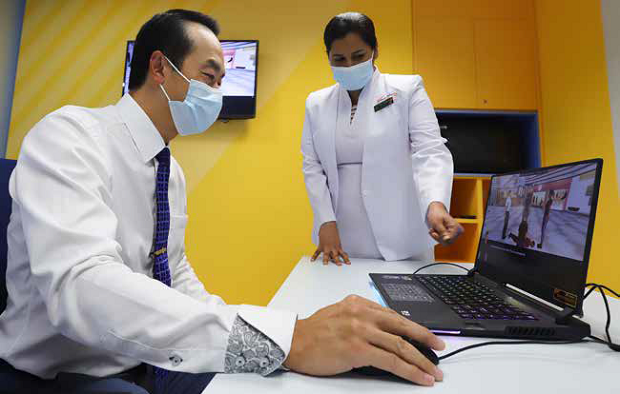
<<Dr Koh Poh Koon, Senior Minister of State, Ministry of Health and Ministry of Manpower, at the launch of the SIMS i3 Hub, trying out the gaming computers and tablets that are available for both group- and individual-based learning.>>
The SingHealth Duke-NUS Institute of Medical Simulation (SIMS) i3 (inspire, innovate and incubate) Hub may span only 60 square metres, but it houses myriad state-of-the-art equipment, such as extended reality (XR) headsets, gaming computers and tablets, and a haptic floor that can create an immersive environment for participants.
It also leverages serious games to educate a spectrum of healthcare learners. They include doctors, nurses, pharmacists and allied health professionals from across SingHealth institutions and Duke-NUS Medical School, as well as medical students who are posted to the SingHealth Duke-NUS Academic Medical Centre for training.
Currently, the SIMS i3 Hub offers 18 game modules — seven VR-based and 11 browser-based. Some of these games may also be deployed (via web browser or mobile app) for use at other institutions. This allows learners to access them at their convenience.
A key benefit of incorporating serious games in healthcare training is the ability to simulate challenging scenarios for learners to practise critical thinking and decision-making in a safe learning environment, while fuelling high levels of engagement through immersive game play, resulting in prolonged retention of knowledge, said Professor Chan Choong Meng, Group Chief Education Officer, SingHealth.
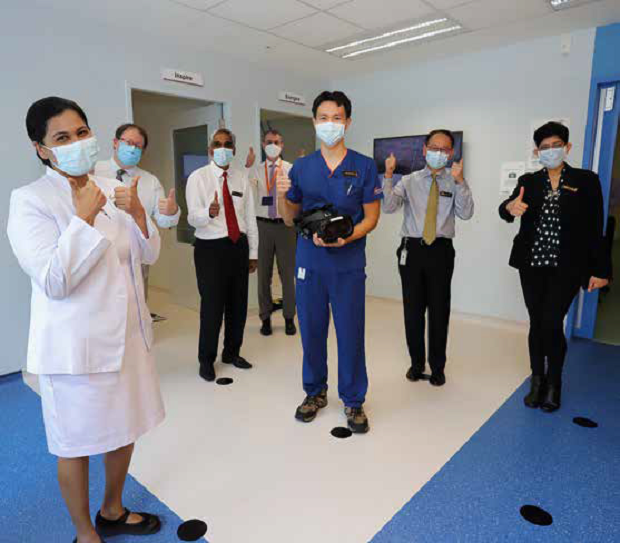
<<(From left) Cigy Manesh, Nurse Educator, SingHealth Alice Lee Institute of Advanced Nursing; Prof Ian Curran, Vice-Dean, Education, Duke-NUS Medical School; Assoc Prof Ruban Poopalalingam, Chairman, Medical Board & Senior Consultant, Department of Anaesthesiology, Singapore General Hospital (SGH); Prof Fernando Bello, Co-Director (Duke-NUS), SIMS; Dr Yee Yucai, Consultant, SGH; Prof Chan Choong Meng, Group Chief Education Officer, SingHealth; Prof Fatimah Lateef, Co-Director (SingHealth), SIMS.>>
What makes serious games in the SIMS i3 Hub especially unique is that every game is developed and carefully curated by SingHealth educators who are themselves experienced healthcare professionals. Each customised game incorporates scenarios that are developed from rich personal insights, extensive clinical know-how and deep expertise that aim to expose learners to potential real-life situations that they may face in the course of their career, said Professor Fatimah Lateef, Co-Director (SingHealth), SIMS.
By incorporating these games into teaching, healthcare professionals are exposed to more engaging and interactive learning aimed at improving patient care.
“The games and simulation practices allow the learner to practise repetitively — what we call ‘deliberate practice’ — so that they can hone their skills and familiarise themselves with the steps and equipment involved. With VR, they can see exactly what you would see in an emergency resuscitation room, for example,” Prof Lateef said.
When learners enter the clinical environment, their repetitive practices will help them adapt quickly and reduce the risk of errors when they perform procedures on patients in real life.
Read more: Playing games can help keep your brain healthy. Click here for more ways to boost your memory naturally.
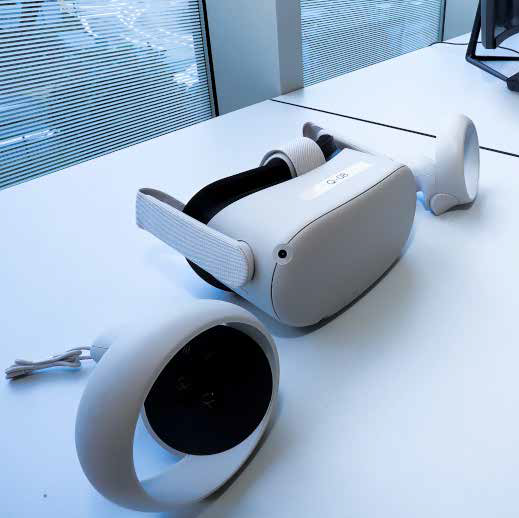
<<A variety of state-of-the-art equipment, such as extended reality headsets, provide an immersive experience and complement training needs.>>
For example, a serious game, developed in collaboration with SingHealth nurses, is designed to teach the setting up of infusions for emergency cases. Patients arriving at the emergency department with chest pains and symptoms of cardiac arrest are classified as critical cases. Nurses familiarise themselves with the dilution of the drug used for infusions through the game and are guided by supervisors during their practices. The steps in the game are designed based on real-life scenarios.
After the training sessions, game data can be extracted to provide educators with useful insights into areas that the learners can improve on. Debrief sessions can also be carried out in the SIMS i3 Hub so that key learning points are captured immediately.
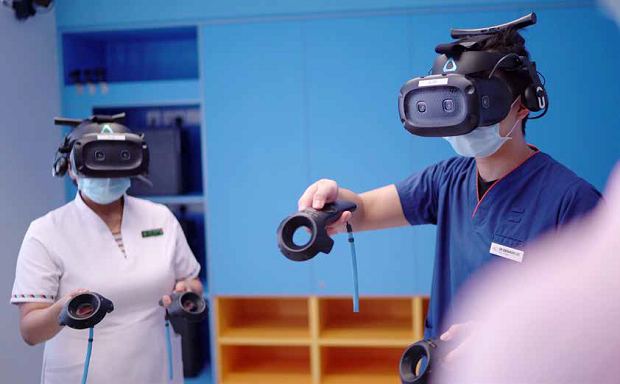
<<The Energise Room hosts multiplayer games that teach skills like management of acute care patients and responding to cardiac arrests.>>
Increased learning efficiency
One important benefit of serious games is that training can now be conducted more efficiently and cost-effectively, as new technologies remove the need for face-to-face sessions. For instance, SingHealth’s e-learning modules on simulation allow users to log on to a virtual platform to read articles and watch videos at their own convenience.
Another example is the Basic Cardiac Life Support (BCLS) game, which enables healthcare professionals to refresh their cardiopulmonary resuscitation (CPR) knowledge and skills remotely. With the BCLS game, learners now only need to attend a physical session for two to three hours and complete an online test, instead of typically spending an entire day in class previously.
Developed by the SingHealth Alice Lee Institute of Advanced Nursing, this game is projected to reduce the duration of in-person training by 25 per cent. It will also be integrated as part of the official BCLS certification training across SingHealth this year, and will train up to 5,000 healthcare professionals every year.
As serious games are able to facilitate remote and virtual learning, they have become especially pertinent in reducing physical contact amid the COVID-19 pandemic.
At the same time, they offer healthcare professionals greater flexibility to train at their own time, without having to compromise or reschedule their clinical commitments.
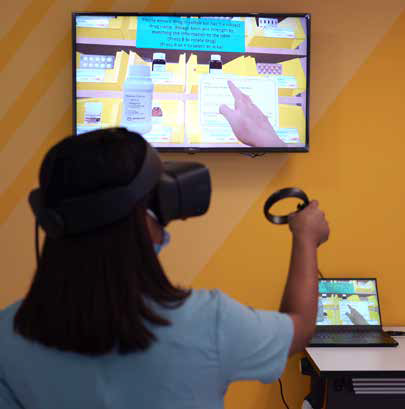
<<Single-player games, which hone skills such as resuscitation and managing pharmacy prescriptions, are conducted in The Inspire Room.>>
More opportunities
Currently, SIMS has a comprehensive library of serious games developed in-house. These cover a wide range of skills, from proper dispensing of medicines in the pharmacy to disaster response protocols, among others.
The launch of the SIMS i3 Hub and development of serious games are opening up new opportunities in healthcare learning. This approach and pedagogy fit in well with the new generation of healthcare professionals, who are well-versed in various digital technologies.
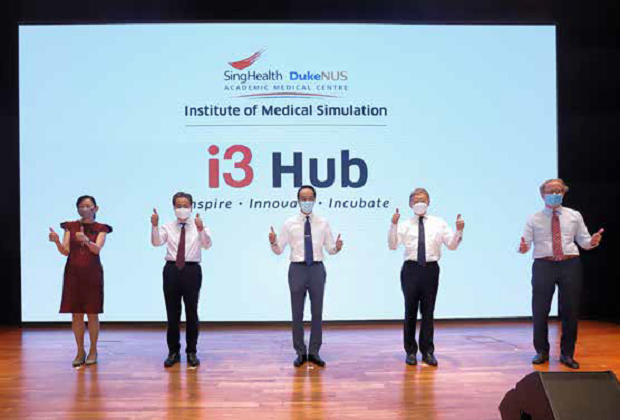
<<(From left) Prof Ivy Ng, Group Chief Executive Officer, SingHealth; Mr Cheng Wai Keung, Chairman, SingHealth; Dr Koh Poh Koon, Senior Minister of State, Ministry of Health and Ministry of Manpower; Mr Goh Yew Lin, Chairman, Governing Board, Duke-NUS Medical School; and Prof Thomas Coffman, Dean, Duke-NUS Medical School at the launch of the SIMS i3 Hub on 18 January 2022.>>
Through the Hub, SIMS aims to inspire collaborations across disciplines and specialties, not just within the various healthcare professions, but also with partners from engineering, computer sciences and serious games associations. In addition, the Hub will also serve as the incubation ground for new ideas and innovations to improve efficiency and enhance patient safety.
Get the latest updates about Singapore Health in your mailbox! Click here to subscribe.
